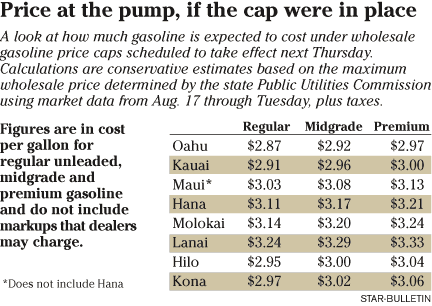
|
‘Shock wave’ at
the pump looming
House Speaker Say hopes oil
companies do not charge
the maximum on Sept. 1
Preliminary calculations show the cost of gasoline could rise once state price controls on wholesale gas take effect next Thursday, but lawmakers who passed the legislation say they do not believe that will happen.
"I truly feel, and I hope I'm correct next week, that oil companies will not raise their wholesale prices" to the maximum allowed, said House Speaker Calvin Say (D, St. Louis Heights-Wilhelmina Rise).
Say and other lawmakers said they believe oil companies have kept prices lower than they would normally, anticipating that they might be allowed to charge more once the law goes into effect.
"Personally, I would say maybe (they are holding prices down) just to bring it up come Sept. 1 to have a shock wave," Say said yesterday in a meeting with Star-Bulletin editors and reporters.
Messages left after business hours yesterday with officials from Chevron USA Inc. and Tesoro Hawaii Corp. -- the state's two major wholesalers -- were not immediately returned.
In a statement, Tesoro said its Hawaii operation believes any cap "will only serve to distort market forces and will result in long-term negative impacts to the citizens and the economy of Hawaii."
Oil companies have long faced allegations of manipulating the market in Hawaii to keep prices artificially high. Industry officials say it is Hawaii's remote location, high tax structure and an anti-competitive marketplace that keep prices high.
"Every expert who's looked at that allegation (of market manipulation) has not found it to be true," said Melissa Pavlicek, a spokeswoman for the Western States Petroleum Association, an industry trade group.
But Say said he believes that without the price cap legislation in place, prices in Hawaii "could have been $3 a gallon, comparable to what the increase has been on the mainland."
According to the AAA Fuel Gauge Report, the nation's average gas price has risen 32 cents in the last month, while Honolulu's average price is up 20 cents.
The nationwide average for regular unleaded hit a record high of $2.61 a gallon this week. Yesterday, the auto club listed the average statewide retail price of regular unleaded at a record $2.84 a gallon, 4 cents higher than California and the highest in the nation. Prices already have topped $3 a gallon for regular unleaded on Maui and for higher grades of gasoline on Oahu.
The auto club listed this week's average retail prices for regular, unleaded gasoline at $2.76 in Honolulu, $3.02 in Wailuku and $2.85 in Hilo, all record highs.
Using figures released yesterday by the state Public Utilities Commission, Star-Bulletin estimates show the cost for regular unleaded on Oahu would be about $2.87 a gallon, including taxes and assuming a traditional 12-cent markup by dealers. Prices would be about $3.03 a gallon on Maui and $2.95 a gallon in Hilo.
No one knows exactly what will happen when the price controls kick in next week.
Wholesalers are not obligated to charge the maximum allowed, but many analysts expect they will while they adjust to the new regulations. Chevron and Tesoro have not said whether they would charge up to the maximum.
While Gov. Linda Lingle has the authority to suspend the law if it is determined to affect public welfare, Say said he hopes the governor will allow it to remain in place until at least the end of the year.
"I hope the governor would give it at least four months, on a trial basis, so we can gather more and more data," Say said. "If she suspends the law -- and it's up to her -- great, but if prices go up, don't blame the law.
"I've been very optimistic that this law will be very effective in understanding the costs of a barrel of crude oil and how it impacts all of the state of Hawaii."

www.hawaii.gov/budget/puc/gaspricecaps
E-mail to City Desk
[News] [Business] [Features] [Sports] [Editorial] [Do It Electric!]
[Classified Ads] [Search] [Subscribe] [Info] [Letter to Editor]
[Feedback]
